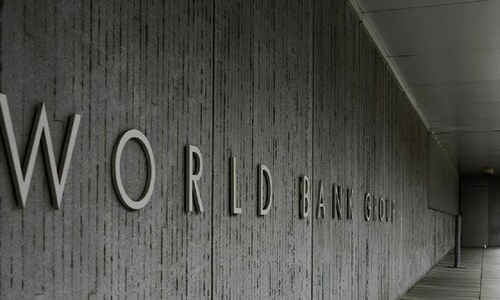ISLAMABAD: The World Bank Group (WBG) has devised a roadmap outlining a medium-term targeted approach encompassing 15 months till ending June 2023 to respond the crisis in the wake of war in Ukraine in the amount of $170 billion.
This roadmap will support developing countries as they address the human and development setbacks caused by compounding crises — impacts of the war, including food and fuel price shocks, and disruptions to trade, supply chains and foreign direct investment, Covid-19 pandemic and climate change.
According to the document titled ‘Global Impacts of the War in Ukraine’, seen by Dawn, the WBG management will explore with its board of executive directors to put in place a 15-month crisis response envelope of around $170 billion for the period between April 2022 and June 2023.
In concert with its development partners, the WBG surge crisis response will provide focused support for developing countries as they confront the impacts of the war. In addition to addressing the impact of the war in Ukraine, the proposed surge financing will sustain WBG high impact support for responding to the Covid-19 pandemic, accelerating climate change adaptation and mitigation, as well as promoting durable economic recovery through GRID. Strong partnerships at the international and national level will be integral to WBG crisis response and client engagement.
Plan to include increased support to Ukraine and countries hosting refugees; addressing food vulnerabilities
In the remaining quarter of financial year 2022 (April-June), the World Bank Group intends to prioritise an initial crisis response with total commitments of around $50 billion.
The initial WBG response will include increasing support to Ukraine, countries hosting refugees from Ukraine, and the wider developing world to address crisis impacts on the poor and vulnerable. This will build on the results achieved under the Covid-19 Crisis Response.
While supporting the needs arising from the war in Ukraine, the WBG will promote sustained focus on longer-term development priorities that are integral to the achievement of the WBG twin goals of eliminating extreme poverty and promoting shared prosperity in a sustainable manner.
Food prices in real terms are going up rapidly in the context of current and anticipated supply constraints. It is critical to avoid making the situation worse by imposing export restrictions and price controls. Enabling market access and protecting the population against food vulnerabilities through social transfers are central to the WBG response.
The WBG’s medium-term response, comprising surge financing to facilitate strong client engagement and meet heightened client demand across the WBG client base, will be set out in a Global Crisis Response Framework Paper to be presented to the Board by end-June 2022, says the document.
The still unfolding impacts of the war in Ukraine demand decisive action to protect the poor and vulnerable, boost the response capacity of developing countries, and restore momentum on longer-term development goals in a world beset by compounding crises.
Commodity price shocks have differentiated impacts across regions as well as between countries and within countries depending on policies, institutions and existing levels of inequality.
World Bank estimates for South Asia point to a decline in real income growth because of the war — 1.3 percentage points due to slower GDP growth and one percentage point due to terms-of-trade losses. The immediate food security impacts of the war in Ukraine are on countries heavily dependent on Ukrainian and Russian imports and on importers more broadly given the sharp increase in world wheat prices.
Published in Dawn, April 25th, 2022












































